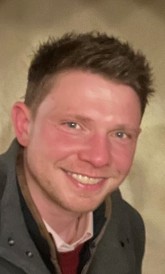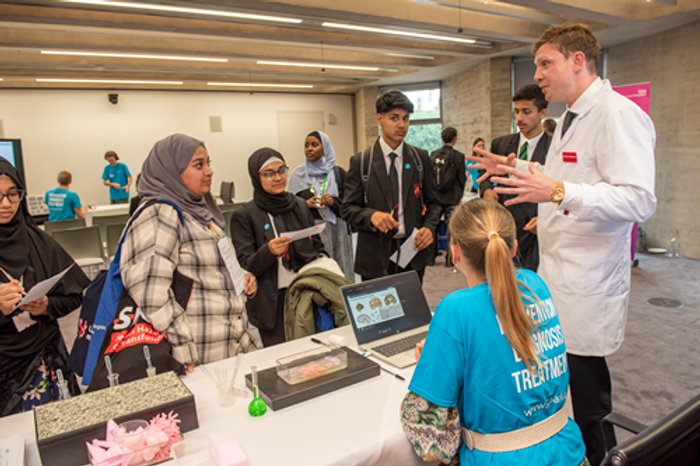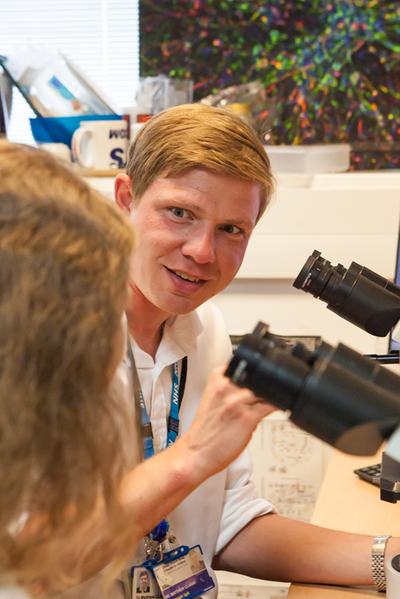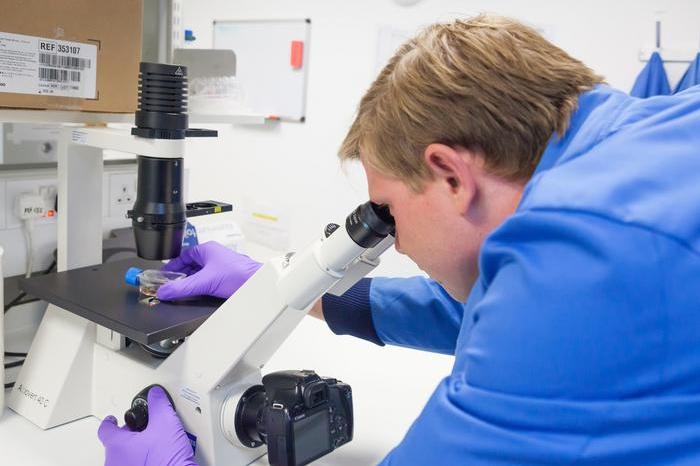
This role is instrumental in helping the College increase awareness of pathology specialties among graduates from UK medical schools, universities and foundation training. The position had been vacant for some time, but we were delighted to appoint Dr Clarke as Undergraduate and Foundation Lead earlier this year. He will work closely with the College’s Events, Training, and Corporate and Public Engagement teams in this varied role.
Dr Clarke is a specialty registrar and National Institute for Health and Care Research (NIHR) Clinical Lecturer in diagnostic neuropathology based at Great Ormond Street Hospital for Children for his clinical work, and the Institute of Cancer Research (ICR) for his research. He has been involved with the College for a number of years. We asked him a few questions about why he decided to apply for the role, and what he wants to achieve during his time in the role.
You’ve been working with the College for many years now; how did you first get involved?
When I became a histopathology resident, I truly felt that I had found my ‘home’ in medicine; everything fitted so well with my interests and career aspirations. I was eager to get involved as much as I could to support the specialty and the College was naturally one of the first places to explore. I initially got involved in different public engagement opportunities, which I thoroughly enjoyed, and joined the Trainees’ Advisory Committee (TAC). I really enjoyed representing trainee views, meeting College officers and learning more about the challenges affecting the specialty and what we could do to help support trainees. I progressed through several positions including Examinations Committee representative, Vice Chair, culminating in a 4-year term as the Chair of the TAC.
Each of these roles was challenging in its own way, but I was able to work with a fantastic team of people as part of the TAC and many different members of the College team – it was thoroughly rewarding. I actually missed it a lot when it finally came to an end! I would definitely recommend that any resident, no matter which pathology specialty, considers getting involved in the engagement work of the College or exploring a role on the TAC.
I find engagement work extremely rewarding, particularly when you see the ‘spark’ develop in others.
Why did you apply for the role of Undergraduate and Foundation Lead?
For a long time now, I have been a very proactive supporter of the next generation of pathologists. I have been regularly involved in careers fairs, I was one of the founding organisers of the annual and hugely successful Path to Success and the BDIAP/RCPath foundation and undergraduate taster events, and have been part of the Pathology Summer School for over 10 years. I’ve helped to mentor many residents as they make their way through the application and interview stages. This role therefore appealed to me as an opportunity to continue this work, but also to expand on this further.
I find engagement work extremely rewarding, particularly when you see the ‘spark’ develop in others. I also really enjoy working with the associated College teams in these areas; many of whom I have known for years now. Taking up this role was a great opportunity to work alongside them again.

What role do you see the College playing in encouraging undergraduates and foundation doctors into pathology?
I think the College has a huge role to play in this area. As with other royal colleges, it is the natural place for prospective residents to turn to and it is essential that all the information and resources that they might need is available. However, the College is not alone in this role; the other allied pathology organisations including the British Division of the International Academy of Pathology (BDIAP), the Pathological Society, the British Neuropathological Society, and the Association of Clinical Pathologists among others, also have the same mindset. It has been fantastic to be part of some of the collaborative ventures that have come from this unified desire to help support the future of the specialty.
Many College members also support prospective residents in their individual centres too; providing support and resources to these members to help with this is also a key part of this work. It is not just in the UK where this work is relevant; many of the events I have been involved with have reached a wide international audience – encouraging recruitment on an international scale is so important.
I am keen to push for more inclusion of pathology within the undergraduate curricula, a vital element that continues to decline.
What do you want to achieve in this role?
Many things! I would like to build on our existing programme of events that support undergraduates and foundation doctors to ensure they receive the right information and guidance to help make decisions regarding their career choices related to pathology. For our in-person events, one of the trends we have noticed is that there is a high level of interest but attendance is often restricted because of the venue’s capacity. I therefore would like to explore ways to ensure those who are unable attend have access to similar events.
I want to ensure the College website has all the necessary information that a prospective resident might need, including links to other relevant sites and resources from allied organisations.
I would like to share individual stories from current residents, highlighting their varied journeys into pathology, along with top tips and advice for overcoming particular hurdles. This could potentially grow into mentoring opportunities across pathology specialties. I am keen to push for more inclusion of pathology within the undergraduate curricula, a vital element that continues to decline. This lack of exposure negatively impacts junior residents when they leave medical school and pathology, which needs to be on their radar as a potential career early on in their training.

Engage in opportunities when you are able to, and I am sure you will really enjoy being part of them.
What would you say to early career doctors who might like to get involved in the College and public engagement work but worry about the commitment?
This is an understandable concern; training and life in general is very busy and time is short. However, I have always found the College teams to be very understanding and flexible in appreciating the situation you are in. They may be able to work around some of the challenges to ensure you can take part at the best time to suit you. You will never feel any pressure, and if you do, you just need to speak up – there is always understanding and never any negativity associated with doing so. It is very easy to say “yes” to every opportunity that comes into your inbox, and one of the skills that you have to learn in training is when to say “no” – I am definitely not a role model for doing this well. Engage in opportunities when you are able to, and I am sure you will really enjoy being part of them. But everyone knows that this does not mean you can take part in every single one, just because you say “no” to one, does not mean you won’t be asked again, or that a similar opportunity won’t come up again. Finding a mentor to help you with these decisions might be helpful.

Dr Clarke is giving a special webinar ‘Pathology for undergraduates and foundation doctors – mystery cases’ on Thursday 6 November. Find out more and book your free place here. This event is part of National Pathology Week, which runs from 3 to 9 November, and is our annual celebration of pathology where we highlight the important contribution pathologists make to healthcare. You can find details of all forthcoming public engagement events here.
You can find out how to get involved with the College, including current volunteering opportunities, here.

